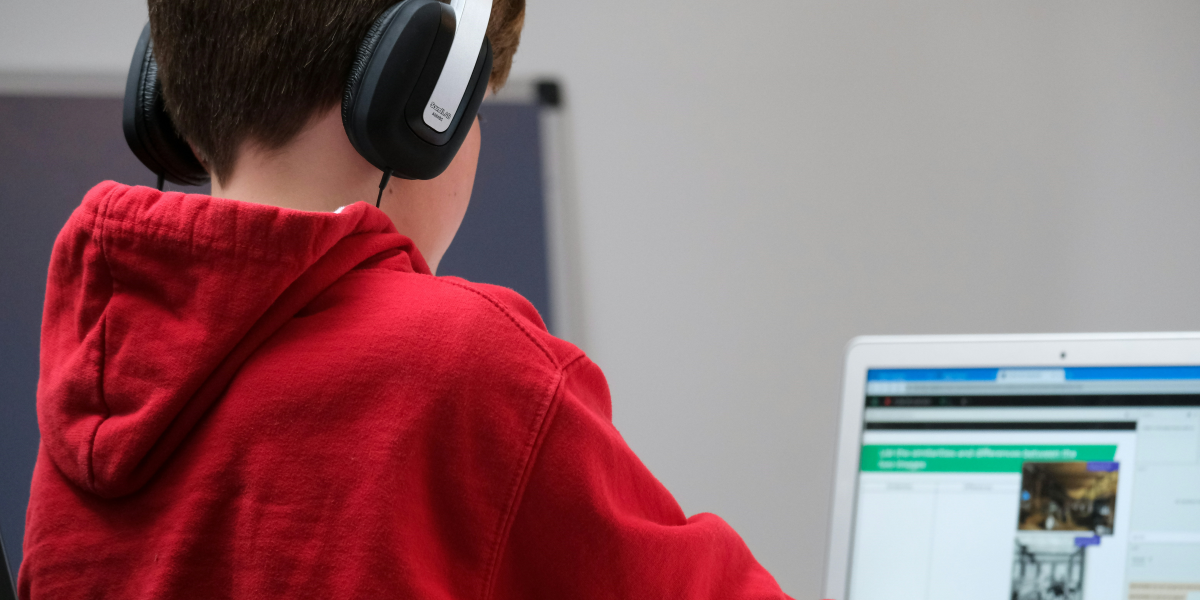By: Joshua Finley
Learning from home can be hard for kids. Henry Lang, a student with ADHD, shares how to stay focused. This article will give you tips to help your kid concentrate better at home.
Essential Strategies for Focus
To help kids focus while learning at home, it’s key to set up a special place just for studying. This spot should feel cozy and be away from noise and distractions. Making a daily plan that doesn’t change much can also help keep them on track.
Create a Dedicated and Comfortable Study Space
A dedicated study space needs to be cozy and clean. A messy room can distract kids from their studies. Making a spot just for learning helps them focus better. It’s like giving their brain a signal that it’s time to work.
The OneTab Chrome App is great for keeping computer tabs tidy too.
A cluttered desk is a sign of a cluttered mind. So, make sure the study area is well-organized. This simple step boosts concentration and makes chunking information easier. With everything in its place, recalling facts and boosting confidence become much smoother tasks for young learners.
Establish a Consistent Daily Routine
A daily routine helps kids learn better at home. It creates a sense of order and discipline. Start each day at the same time. This builds a strong foundation for focus. Schedule study sessions and breaks.
Short, frequent breaks keep brains fresh and ready to learn.
Kids thrive with structure in their lives. Set up specific times for each subject or activity. This helps them switch between tasks smoothly. Use brain games to boost concentration during those study periods.
Staying hydrated also aids in keeping attention sharp, so have water nearby!
Tips to Enhance Concentration
Keeping kids focused can be tricky, but a few simple tricks can help. Short breaks work wonders to keep their minds fresh. Fun brain games are a great way to boost focus too. Don’t forget about hydration—it helps keep energy levels up!
Incorporate short, frequent breaks
Short breaks can help kids focus better while learning. They refresh the mind and keep energy levels high. Here’s how to make those breaks effective:
- Take short, timed breaks: Aim for a 5-10 minute break every 25-30 minutes of study. This helps reset their focus and can prevent fatigue.
- Do a “brain boost”: When kids start to drift off, suggest fun activities like jumping jacks or quick stretches. These activities get the blood pumping and improve alertness.
- Stay hydrated: Encourage drinking water during breaks. A study shows our brains need water to process thoughts and memories well.
- Use the breaks wisely: Kids can step outside for fresh air, grab a snack, or do a few quick exercises during these times.
- Limit screen time: During breaks, avoid screens if possible. Too much screen use can lead to more distractions later on.
- Encourage teamwork: Pair up kids for short games or challenges during their breaks. This keeps things fun while they recharge together.
Taking these short breaks is vital for boosting concentration and keeping that motivation alive… Now, let’s look at ways to minimize distractions in their study space!
Use focus-boosting activities like brain games
Brain games can really help kids stay focused while learning. These activities boost their brains and keep them sharp. They can include puzzles, memory games, or quizzes that challenge thinking skills.
Engaging in these fun tasks breaks the routine and refreshes attention.
Playing brain games also teaches new skills without feeling like schoolwork. Kids might learn to work through problems or think creatively. This balance is key for effective learning at home.
Next up, let’s discuss how to limit distractions for better focus!
Hydrate Regularly
Taking short breaks helps kids recharge. Hydration plays a key role in this. Drinking enough water keeps the brain alert and focused. It’s easy to forget, but having a water bottle on the desk can remind them to sip regularly.
Classical music or ambience sounds can also help create a calm study space. Many kids enjoy listening while they work. This mix of hydration and sound can help boost concentration during learning sessions at home.
Minimizing Distractions
Too many distractions can hurt focus. Start by turning off notifications on devices. Keep phones and tablets out of reach during study time. A clean workspace also helps a lot. Arrange all supplies ahead of time so your child spends less time searching for things…
This way, they may concentrate better and learn more.
Limit digital interruptions
Digital interruptions can break a child’s focus. Keeping distractions away helps in effective learning. Here are some tips to limit these interruptions:
- Set Screen Time Limits: Limit time on devices, like phones or tablets. Too much screen time can distract kids from learning.
- Use Apps for Focus: Tools like the OneTab Chrome App help tidy up browser tabs. This reduces clutter and limits digital interruptions while studying.
- Turn Off Notifications: Disable notifications on all devices during study time. Sounds and alerts can lead to lost concentration.
- Designate Study Hours: Create specific times for studying with no device use allowed. Sticking to a schedule helps build habits.
- Organize Digital Files: Keep files and folders neat on computers or tablets. This saves time searching for materials, allowing kids to focus better.
- Encourage Offline Activities: Suggest activities that don’t involve screens, like reading or art projects. These keep the mind engaged without digital distractions.
- Use Do Not Disturb Mode: Activate this mode on devices during homework sessions. It blocks incoming messages and calls, creating a calm environment.
- Limit Social Media Access: Discuss the impact of social media on focus with your child. Reducing access can help them concentrate better on learning tasks.
Following these steps can empower children to stay focused while learning at home and avoid overwhelming thoughts from constant digital inputs—a task easier said than done!
Organize Study Materials Beforehand
After limiting digital interruptions, it’s important to organize study materials beforehand. A tidy space helps kids focus better and learn more effectively.
- Gather supplies: Collect all the books, notebooks, and tools needed for the learning session. Having everything ready saves time and keeps attention on tasks.
- Create a checklist: Write down what needs to be done for schoolwork or personal goals. Keeping a list helps kids see their progress and stay focused.
- Use folders or binders: Organize papers in separate folders by subject. This makes it easier to find things quickly when studying.
- Prepare a study area: Set up a clean and comfortable desk or table. A cozy spot makes studying feel more inviting and less stressful.
- Set aside materials: Keep extra items out of reach while studying. Fewer distractions mean kids can concentrate better on their work.
An organized environment clears mental clutter, helping kids learn and stay focused on what matters most.
Engaging Learning Techniques
Kids can learn better when they mix things up. Switching subjects or study areas keeps their minds fresh and engaged. Moving around helps too—simple exercises can wake them up! Fun brain games bring joy to learning, making it feel less like a chore.
However, for children who need more personalized support, private tutoring can offer tailored learning strategies and one-on-one attention that may not be available at home. This extra guidance helps ensure your child stays on track and receives the help they need to excel academically.
Switch Between Different Subjects or Study Areas
Switching study spots can help kids stay focused. Changing subjects or areas keeps things fresh. It breaks the monotony and sparks interest. For example, move from math to reading or science.
This change boosts concentration and helps with cognitive processes.
Learning a new skill can also be fun. Try finger spelling, knitting, or computer coding after studying hard subjects. These activities balance learning with playtime. They offer a break while still engaging the brain…
all while helping kids stay alert and ready to learn more!
Encourage Physical Activity to Boost Alertness
Switching subjects can help keep kids engaged. Physical activity is another great way to boost alertness. Doing quick exercises, like jumping jacks or stretching, gets the blood flowing.
This helps kids feel more awake and ready to learn.
Short breaks for movement can clear their minds too. A brisk walk around the house recharges energy levels. Staying hydrated is also key; drinking enough water keeps them focused during study time.
Keeping things active makes learning fun and effective!
Conclusion
Learning at home can be fun and effective. Kids can focus better with the right tools and tips. A cozy study space, regular breaks, and plenty of water work wonders. Mixing up subjects keeps things fresh, while staying active boosts energy.
Published By: Aize Perez






